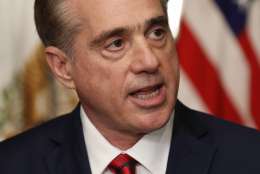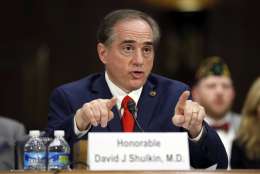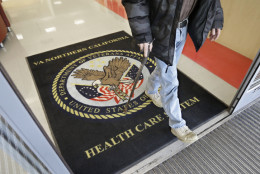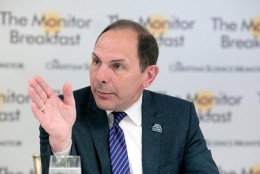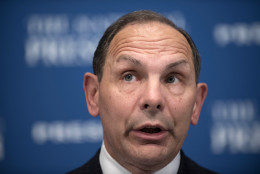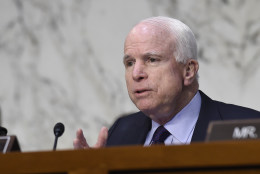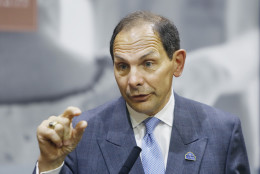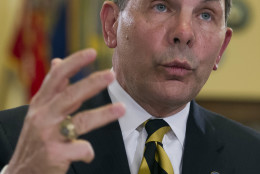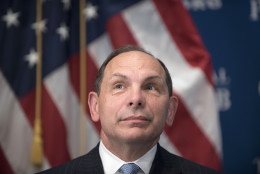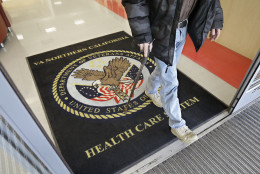Senate Veterans Affairs Committee
-
An extension and then redesign of the Veterans Choice Program, along with new employee accountability legislation, are top priorities for new Veterans Affairs Secretary David Shulkin. He said he's working with Congress on new legislation to support those initiatives.
February 28, 2017 -
David Shulkin, President Donald Trump's pick to lead the Veterans Affairs Department, earned high praise from the Senate committee during his nomination hearing. Changing the department's current Veterans Choice Program and crafting new accountability and disciplinary procedures for VA employees were common topics.
February 02, 2017 -
Leadership is changing in six congressional committees with jurisdictions that could affect the way feds do business governmentwide.
December 13, 2016 -
The Senate Veterans Affairs Committee took on the recommendations from the VA Commission on Care's recent report on veterans health care.
September 15, 2016 -
Senate Veterans Affairs Committee Chairman Johnny Isakson (R-Ga.) said the Veterans First Act, which the department itself is actively supporting, has hit a few roadblocks. He hasn't yet been able to bring the omnibus to a vote in the full Senate but said he is optimistic Congress will pass new veterans legislation this year.
August 04, 2016 -
A recent decision from the Justice Department is prompting the VA to stop using the authority it has under current legislation to fire senior executives more quickly. The Senate Veterans Affairs Committee said the news comes after an inquiry over whether the VA planned to make any policy changes after the DOJ decision, which ultimately ruled that a key provision in the VA Choice Act is unconstitutional.
June 17, 2016 -
The Senate is still debating whether it should overhaul current programs at the Veterans Affairs Department that give veterans access to private health care or revise certain pieces of it. At the same time, the VA said it's close on finalizing a new appeals process, but the committee is concerned the VA's plan does little to address the current backlog of 450,000 unresolved claims.
May 25, 2016 -
VA Secretary Bob McDonald said his department is different enough from other federal agencies that a separate personnel system is appropriate for VA senior executives. McDonald also said the department is working on new performance standards to measure veterans' satisfaction with VA medical facilities and the time it takes to receive an appointment.
May 23, 2016 -
At nearly 400 pages, the Veterans First Act, which the Senate Veterans Affairs Committee introduced last week, covers everything from veterans homelessness to more flexible work hours for VA doctors and nurses. But VA's senior executives are still the main target of the legislation.
May 04, 2016 -
With roughly nine months until Inauguration Day, VA leadership is trying to implement a major transformation to the way it delivers health care and interacts with veterans and its own employees. But the department needs a plan and a new governance structure in place to ensure that whatever progress is made now endures beyond Jan. 20, 2017.
April 18, 2016 -
Negotiations between the House and Senate VA committees over a new veterans omnibus have stalled, as the Veterans Affairs Department releases more details in its plan to change accountability procedures for its senior executives.
April 07, 2016 -
Accountability in the Senior Executive Service will be at the center of congressional discussions on a new omnibus legislative package for the Veterans Affairs Department. Senate VA Committee Chairman Johnny Isakson (R-Ga.) said he wants the VA and the committee to finish its work on the legislation by April 1.
March 16, 2016 -
More than half of current and former senior executives at the Veterans Affairs Department oppose the VA's proposal to reclassify some SES members under Title 38, according to the preliminary results of a recent survey from the Senior Executives Association.
March 10, 2016 -
VA Secretary Bob McDonald and Deputy Secretary Sloan Gibson are working with Congress on a proposal that would strip senior agency executives of their rights to appeal to the Merit Systems Protection Board when they face disciplinary action. But the proposal faces growing criticism from the Senior Executives Association and others.
February 12, 2016 -
Michael Missal, the president's nominee to lead the VA's Office of Inspector General, appeared before the Senate Committee on Veterans' Affairs to answer questions on how he plans to hold accountable the struggling agency.
November 18, 2015

